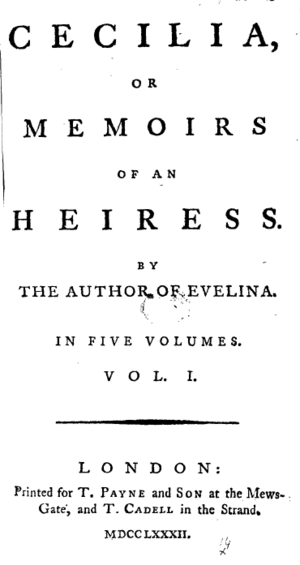Cecilia (novel) facts for kids
Cecilia, also called "Memoirs of an Heiress", is an old novel from the 18th century. It was written by Frances Burney. The book is a funny and smart love story. Many famous people liked it, including Edmund Burke, Mary Wollstonecraft, and Choderlos de Laclos.
About the Book
Cecilia was published in July 1782. Frances Burney started writing it in 1780. Her father, Dr. Charles Burney, and her friend, Samuel Crisp, did not want her to write a play. They thought novels were more suitable for a lady. Dr. Burney told her, “In the Novel way, there is no danger.” This made Frances Burney unhappy. Some people think this is why Cecilia feels a bit sadder than her first novel.
Main Characters
Here are some of the important people you will meet in Cecilia:
- Cecilia Beverley: She is the main character and a heroine. Cecilia is beautiful, smart, and often puts others first. She is very honest. She also cares a lot about other people's problems, especially those who are poor.
- Mortimer Delvile: He is the son of Cecilia’s proud guardian, Mr. Delvile. Mortimer is not handsome, but his face shows a lot of feeling. At first, he tries not to love Cecilia because he is too proud. But when he learns she loves him too, they decide to marry in secret. He is very loving, especially to his mother and Cecilia.
- Priscilla Harrel: She is Cecilia’s friend. Priscilla is sweet but not as clever as Cecilia. After she marries Mr. Harrel and moves to the city, she becomes more interested in parties. She stops caring about Cecilia as much.
- Mr. Harrel: He is one of Cecilia’s guardians. Mr. Harrel loves to gamble and is very selfish. He does not care about poor people. He often tries to borrow money from Cecilia and Mr. Arnott. He also loves parties, just like his wife.
- Mr. Briggs: Another of Cecilia’s guardians. He is a short, strong man who loves money very much. He enjoys making fun of Mr. Delvile.
- Mr. Delvile: He is Cecilia’s guardian and Mortimer’s father. He is very proud and selfish. He cares a lot about his family and his big castle. However, he truly loves his son. When Cecilia almost dies, he becomes much kinder to her.
- Mrs. Augusta Delvile: She is a kind, smart, and charming woman. She is very nice to Cecilia, who loves her. But she is also proud and does not want her son to change his family name.
- Mr. Monckton: He pretends to be Cecilia’s friend. He married an old, ugly woman for her money when he was young. Now he wants to marry Cecilia as soon as his wife dies. Because of this, he hates Mortimer and later fights with him. Cecilia does not know he likes her and thinks he is clever and kind at first.
- Lady Margaret: She is Mr. Monckton’s angry, jealous, old, and ugly wife.
- Sir Robert Floyer: A selfish man who wants to marry Cecilia because she is pretty and has a lot of money. Cecilia does not like him at all. But Mr. Harrel tries to make them marry.
- Mr. Belfield: He is a good-hearted man but struggles to find a job he likes. He is proud and does not want anyone to know his father was a tradesman.
- Henrietta Belfield: She is Mr. Belfield’s sister. Henrietta is thankful, loving, and honest. She thinks more about her brother and Cecilia than herself. She likes Mortimer Delvile and is sad when he marries Cecilia. Later, she marries the gentle Mr. Arnott.
- Mr. Arnott: He is the gentle, shy, and serious brother of Mrs. Harrel. He wants to marry Cecilia. He is the only person Cecilia feels truly sorry for when she says no to him. He is not as brave as Cecilia, but he has a good heart. He helps poor families and feels bad for his sister.
- Albany: A grumpy old man who tries to help poor people. He is surprised by how kind Cecilia is.
- Lady Honoria Pemberton: She is a relative of Mrs. Delvile. Lady Honoria loves to gossip and tease Cecilia. Her teasing makes Cecilia sad. She also likes to laugh at Mr. Delvile and his castle.
- Fidel: Mortimer’s dog. Cecilia loves Fidel and talks to him about how much she loves Mortimer.
Cecilia and Other Writers
Cecilia was a very important book. Other famous writers mentioned it in their own works.
Jane Austen, a well-known writer, talked about Cecilia in her novel, Northanger Abbey. She wrote about how people might pretend a novel is "only a novel." But then she lists Cecilia as a book that shows "the greatest powers of the mind" and "complete knowledge of human nature." This means she thought it was a very smart and insightful book.
The title of Austen's famous book, Pride and Prejudice, might have come from Cecilia. At the end of Cecilia, a character named Dr. Lyster says: “remember: if to pride and prejudice you owe your miseries, so wonderfully is good and evil balanced, that to pride and prejudice you will also owe their termination.”
In her last novel, Persuasion, Jane Austen also mentions a character from Cecilia, calling her "the inimitable Miss Larolles."
In William Makepeace Thackeray's novel, Vanity Fair, one character writes to another. She says they "used to read Cecilia at Chiswick." This shows how popular Cecilia was.
Related Pages
- Northanger Abbey
- Frances Burney
- Camilla
- Evelina


